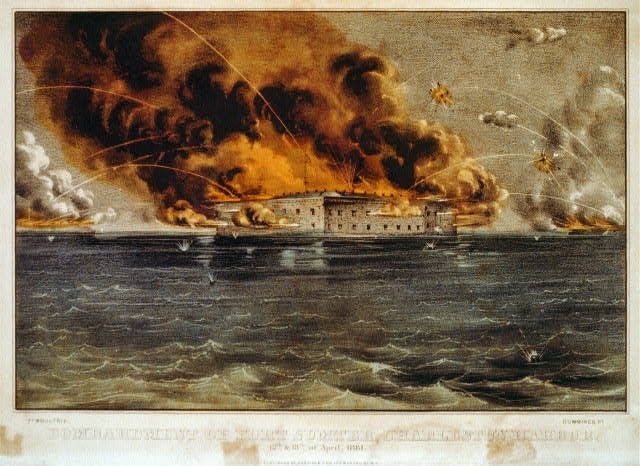China’s president Xi Jinping is not known to be a student of American history. If he were, he might be asking himself what the American fuss over Taiwan is all about. Didn’t America’s greatest president, Abraham Lincoln, achieve his greatness by preventing renegade separatists from fracturing his country? Wasn’t he willing to wage war—a very terrible war—to preserve American unity, thereby ensuring America’s future against domestic insurrections and foreign rivals?
Even while thinking this way, a Xi familiar with American history might wish, at a tactical level, that Taiwan bore the same relationship to China’s mainland that Fort Sumter did to mainland South Carolina. The fort, on an island in the harbor of Charleston, was indefensible against artillery then available. Lincoln and the leaders of the rebellion maneuvered politically for a time before the fort needed reprovisioning. When Lincoln ordered such reprovisioning, the rebel militia opened fire on the fort and quickly compelled its surrender.
China and the United States have been maneuvering politically over Taiwan for a much longer period. China doesn’t yet have the weaponry to make Taiwan indefensible. But it’s closer to that goal than it was when the maneuvering began, and it continues to close the gap. The current Chinese military exercises in the vicinity of Taiwan have the aim, among others, of demonstrating China’s progress on this front. Presumably Xi hopes a time will come when taking Taiwan will be little harder than taking Fort Sumter was for the rebels of South Carolina.
Channeling Lincoln once again, Xi would answer objections that taking Taiwan would violate the rights of the residents of Taiwan to self-determination, by pointing out that self-determination was precisely what Lincoln denied to South Carolina and the other Confederate states. Each of those states had proclaimed independence of the United States by democratic means, through conventions of the people. Besides, Xi would add, Taiwan has not declared independence from China.
Yes, but Taiwan has exercised independence for decades, would be the rejoinder. Seizing Taiwan, therefore, would be tantamount to conquering an independent country. The Confederacy never achieved effective independence.
Not so fast, America-expert Xi would reply. The concept of states’ rights was as old as the American republic. Thomas Jefferson in the 1790s, Daniel Webster in the 1810s, John Calhoun in the 1830s, and many others contended that the states were the final arbiters of political authority in America. The states, out of their good will toward the Union, had declined to exercise that right until the 1860s, but they had never relinquished it. And the Supreme Court had never said they were wrong. In rejecting the rebel states’ interpretation of their rights and of the Constitution, Lincoln was denying a principle of long standing.
In reality, Xi is not an expert on American history. He likely believes American history has nothing to teach China. The point of this thought-experiment is not to get inside Xi’s head but to get Americans to think carefully about their government’s policy regarding China and Taiwan. The visit to Taiwan this week by House speaker Nancy Pelosi, following various statements by President Joe Biden, suggests a stronger commitment to the independence of Taiwan than recent administrations have been willing to make. Is this really the direction America ought to be going?
Taiwan is still a harder target than Fort Sumter was. But Taiwan’s defensibility is declining, which means that the costs of defending Taiwan—costs to Taiwan itself, and to the United States in aiding Taiwan—are increasing. Most Americans today praise Lincoln for doing what the American government is condemning Xi for aspiring to. Should America get drawn into a war over Taiwan, this incongruity will certainly become an issue in American politics.
Better to talk about it before the shooting starts. Because one thing Xi certainly knows about American history is that Lincoln prevailed in his contest over national sovereignty.




The issue is NOT cost of defending Taiwan.
America is standing on principle, defending a sovereign nation and important PacRim ally. America also inherited the Pax Americana from the Anglosphere.
So the issue is the cost to anyone who gets between America and those and what she protects, including freedom of navigation.
----------------------------------------------------------------
In contrast, mainland China has waxed and waned throughout the millennia, sometimes ruling over neighbors, other times being under their domination. For example, northern conquerors were simply renamed "Yuan Dynasty" and life went on.
Today, totalitarian xi assails ALL his neighbors, 360° around -- India, Nepal, Vietnam, Taiwan, Philippines, South Korea, Japan, To the west China oppresses Tibet and Mongolia, and perpetrates genocide on the Uighurs.
History will judge the CCP badly.
History will also judge America poorly, if we abandon what is right, to such evil.
More years back (fall 1960, I believe) than I care to count, I took a required US Govt class at UT Austin. One day a student asked the prof what a legal revolution was. The prof immediately answered: "One that succeeds!" I feel the same way about secession. A legal secession is one that succeeds. Why was Kosovo allowed to secede from Yugoslavia? NATO in effect "bombed it free." Why then doesn't the world recognize Northern Cyprus's secession from Cyprus? (Only Turkey does.) Since NATO has no desire to bomb Turkey, Northern Cyprus may become a de jure country (it already is de facto) in a few years.